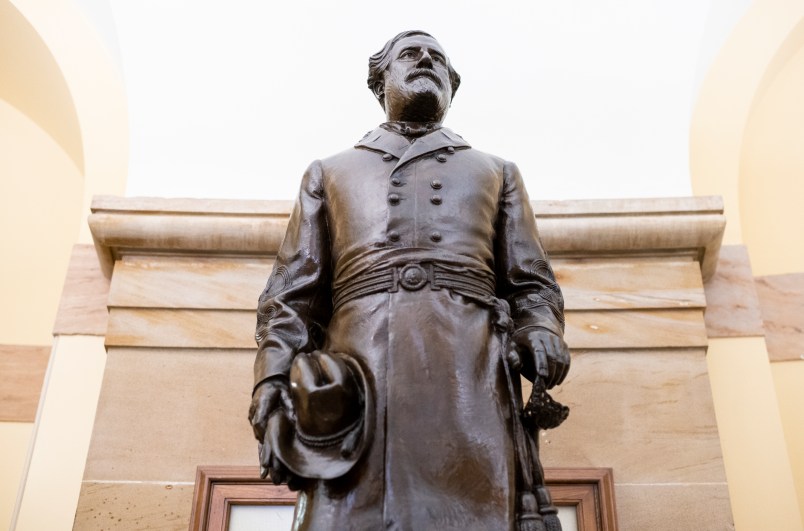The House on Tuesday again will vote on legislation to remove Confederate statues from the Capitol, after the measure failed to gain traction in the then-GOP-controlled Senate last year after it passed in the lower chamber.
The legislation passed in the House in 2020 in a 305-113 vote, with 72 Republicans joining Democrats. The measure then stalled in the GOP-majority Senate.
Earlier this year, House Majority Whip Jim Clyburn (D-SC) reintroduced the bill, citing the deadly Capitol insurrection on Jan. 6 when Trump supporters breached the building with Confederate flags and other symbols of hate in tow. Shortly before the Capitol attack, Trump told the crowd of his supporters at a “Stop the Steal” rally to “fight like hell” to overturn the election results on the day of the joint session of Congress certifying Joe Biden’s electoral victory.
“On January 6th, we experienced the divisiveness of Confederate battle flags being flown inside the U.S. Capitol. Yet there are still vestiges that remain in this sacred building that glorify people and a movement that embraced that flag and sought to divide and destroy our great country,” Clyburn said in a statement when reintroducing the bill in May. “This legislation will remove these commemorations from places of honor and demonstrate that as Americans we do not celebrate those who seek to divide us.”
Although Democrats control both chambers of Congress, and are expected to take it up for a vote in the Senate, it is unclear whether Republican senators would give the 60 votes needed to advance the measure in a 50-50 Senate.
The legislation proposes the removal of statues of figures who served in the Confederacy such as its president Jefferson Davis, vice president John C. Calhoun, North Carolina Gov. Charles Brantley Aycock and Arkansas Sen. James Paul Clarke.
In addition to removing statues of Confederate figures, the measure would also replace a bust of Chief Justice Roger B. Taney — who wrote the 1857 Dred Scott decision that restricted Black people from citizenship — with Thurgood Marshall, the first Black Supreme Court justice.
Democrats’ efforts to push legislation to remove memorials paying tribute to Confederate leaders gained traction last year amid police brutality protests in the wake of George Floyd’s death.
Republicans’ downplaying of the severity of the violence on Jan. 6 has also fueled Democrats’ efforts to hold insurrectionists accountable for the attack that endangered lawmakers’ lives.
In the aftermath of the deadly Capitol insurrection on Jan. 6 that Trump helped incite, Senate Republicans killed the bill that would have established an independent and bipartisan commission to investigate the Capitol attack by deploying the filibuster.
After announcing that House Democrats will form a select committee to investigate the insurrection, House Speaker Nancy Pelosi (D-CA) on Monday indicated that she will appoint 13 members to the select committee, and will consult with House Minority Leader Kevin McCarthy (R-CA) in choosing five of them. Republicans have shared mixed reactions to potentially getting involved with the select committee thus far.







This should have been done years ago. Confederates were traitors to Democracy and should have zero representation in Federal buildings or on Federal property. Just do it!
I’m hopeful it will pass both chambers; I do hope, though, that if any GOPer votes against it, someone will engage them in a discussion of Critical Race Theory and whether their vote is not an implicit affirmation of that theory’s premise.
What’s the over/under on republican senators voting to allow debate? I’m going with 4. But that might be optimistic.
(Then again, Juneteenth, so maybe the optics of openly voting for racism aren’t as good as they used to be.)
I believe the GOP is willing to swap Lee for Jim Crow.
I don’t think they can do that. Only the senate can remove McConnell.